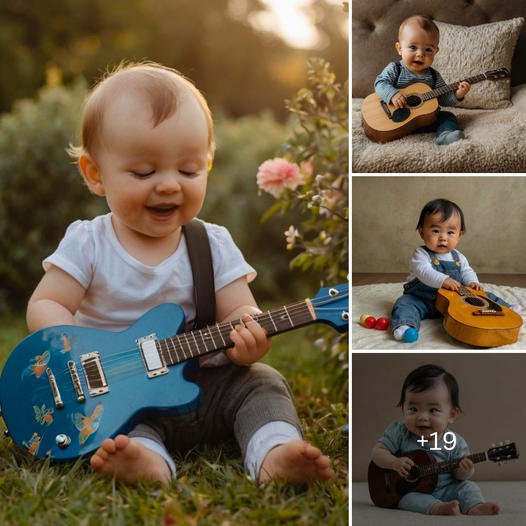Babies are naturally drawn to music and the sensory experiences it offers, and playing the guitar is a fascinating avenue through which they can explore sound and rhythm from a young age. As they strum the strings or tap on the instrument, they begin to engage their senses and develop an early appreciation for music.

A Sense of Discovery and Experimentation
One of the most charming aspects of babies playing guitar is their sense of discovery and experimentation. They are intrigued by the different sounds produced by the strings, and their curiosity leads them to explore how their actions create these musical notes. This tactile exploration helps babies develop their fine motor skills as they grasp the guitar and coordinate their movements to produce sound.

Multisensory Experience
Moreover, playing the guitar provides babies with a multisensory experience. They not only hear the melodies and rhythms but also feel the vibrations of the strings and the resonance of the sound. This sensory input stimulates their auditory and tactile senses, contributing to their overall sensory development.
Cognitive Development
Playing guitar also supports babies’ cognitive development. As they engage with the instrument, they begin to understand cause and effect—the concept that their actions (strumming or tapping) produce specific outcomes (music). This foundational understanding of causality lays the groundwork for problem-solving skills and logical thinking as they grow older.

Emotional Development
Musical play is also beneficial for babies’ emotional development. The soothing melodies or lively tunes can evoke various emotions, and babies may respond with smiles, laughter, or even dance movements. Music has a unique ability to regulate emotions and create a sense of comfort and security, fostering a positive emotional bond between babies and caregivers during musical interactions.
Laying the Foundation for Future Musical Interests
Furthermore, early exposure to music through playing guitar can lay the foundation for future musical interests and abilities. Research suggests that musical experiences in infancy and early childhood can enhance auditory processing, language development, and overall cognitive skills. By encouraging babies to explore music through instruments like the guitar, caregivers support their holistic development and nurture their innate musical potential.

Conclusion
In conclusion, “Baby Playing Guitar: Early Exploration of Musical Curiosity” highlights the importance of musical play in babies’ development. Through playful interactions with the guitar, babies not only engage their senses and motor skills but also begin to form a deeper connection with music. These early musical experiences pave the way for a lifelong appreciation of music and its enriching benefits for cognitive, emotional, and social development.




